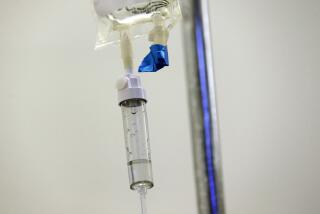ICN Loses $172 Million After Yugoslav Default
- Share via
Government turmoil in Yugoslavia is costing ICN Pharmaceuticals Inc. a bundle.
The Costa Mesa drug company said Wednesday it expects to take a special noncash charge of $172 million, or $1.65 a share, after a government agency defaulted last month on payments for drugs.
ICN has been selling drugs on credit to the Yugoslav government--its biggest customer there--and said it’s attempting to work out new terms.
The company has suspended sales on credit to the government until the problem is resolved and will sell on a cash basis only. The company said the government’s financial situation is affected by international economic sanctions, the costs of waging war and the devaluation of its currency last spring.
ICN officials took the action after a government agency failed to pay $39 million due June 30 and the government sought concessions on other debt. The charge covers expected losses of $160 million the government and related agencies owe the company, and about $12 million for the write-down of ICN investments in health care-related businesses in Yugoslavia.
ICN Chairman Milan Panic, a Yugoslav native who briefly served as its prime minister several years ago, is among company executives involved in the credit negotiations.
“Senior management went over and talked directly with the various ministers and it was determined upon their return that collectability would be rather difficult in the current environment,” said Randy Meier, ICN’s senior vice president and treasurer. “We don’t pretend to predict when the sanctions will be lifted or the conflict end.”
A trading halt was called in ICN shares late Wednesday, after the stock sank $4.50, to $38.63. Volume totaled 1.4 million shares Wednesday--more than twice its recent daily average.
The company announced the huge write-down after the stock market closed, but Meier said that the stock “took a pretty good hit on speculation of what it would do” Wednesday.
In Yugoslavia, about 80% of ICN’s drug sales go through the government, which reimburses patients and pharmacies for the cost, said ICN officials. Last year, the company agreed to extend credit of up to $50 million to the government on a quarterly basis.
Overall, ICN revenue from Yugoslavia last year--including sales through the government, private pharmacies and exports--totaled $225 million, Meier said.
This year, the halting of sales to the government will cause the total to fall to $175 million, he predicted. The company intends to focus on drug sales in Yugoslavia to private pharmacies and hospitals. ICN still expects to post overall revenue of more than $1 billion this year and should still be profitable, Meier said.
More to Read
Inside the business of entertainment
The Wide Shot brings you news, analysis and insights on everything from streaming wars to production — and what it all means for the future.
You may occasionally receive promotional content from the Los Angeles Times.








